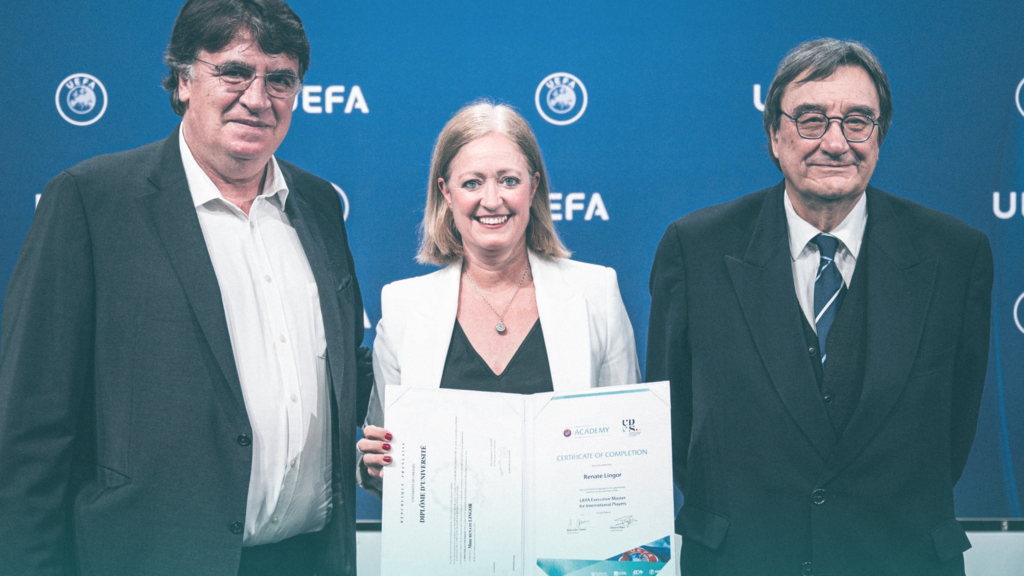
After representing her country on the pitch, Renate Lingor transitioned to a career at the German Football Association, where she flourishes in her role as All-Star Player Co-ordinator.
We caught up with Renate to hear how life has been since retiring her boots.
Where did your passion for football begin?
In Germany, football is very popular. I was lucky enough to have an older brother who let me play with him and his friends. My dad was also a football player, and he was really excited that his children played the game.
When I was five years old, I was asked if I wanted to play at the same club as my brother with all the boys because the coaches saw the talent I had.
I enjoyed playing with the boys, but I knew that one day I needed to play with the girls.
My first club was SC Klinge Seckach, a team in a little city where I grew up. Then, when I was 20, I moved to FFC Frankfurt where my real career started – playing in a very strong team with great teammates.
Eintracht Frankfurt are doing well this season, is it nice to see them succeed?
Of course! There was a time in Frankfurt where the club was just a women’s team and in Germany there were more clubs of the main big teams like Bayern Munich forming women’s teams. They put a lot of money into women’s football, and it was difficult for Frankfurt to compete against them.
So, when Eintracht Frankfurt took FFC Frankfurt into their club, they started to get better again and it’s great to see where they’re at now.
When I played for them, we were always one of the best teams and were in the final almost every year of the UEFA Cup.
We’ve got an exciting Olympic Games coming up this summer, you’ve played at four games, what was that experience like?
It was fantastic! For football it is always a bit different because we also have the World Cup every four years, so we must focus on that too.
My first Olympics were at Atlanta in 1996, we played in Washington and Birmingham at the beginning, but we performed in Atlanta. It was the same in Sydney, because the group stages are always somewhere else.
It feels sometimes like you are not part of the Games. But we were lucky to make it to the final stages.
In 2000, 2004 and 2008 we made it to the semi-finals and that’s when it felt amazing, coming to the Olympic village and competing with your country. The Olympics and the World Cup are always special memories.
Can you tell me about your career off the pitch?
I started working for the German Federation in 2006 and I finished my playing career in 2008 so I already had two years of work experience.
I’ve worked in different departments of the Federation. For example, when we had the Women’s World Cup 2011 in Germany, I was responsible for the training side of the teams.
As a player you’re just there in the stadium but it was really interesting to see how many people work to put on such a great event for the players.
After that, I was a team manager for the women’s U19 and U20 teams and now I am responsible for former players both male and female. I help to bring players closer to the Federation and give something back.
Do you think it’s important for former players to stay working in football?
Definitely! The players know what they need, and not just on the pitch. We are always trying to get better and sometimes when you speak with players, they tell you that certain things aren’t necessary.
They know what they need to be successful, and their experience is very important.
Why did you decide to complete the UEFA MIP Programme?
I was working already, which was different to others on my programme. But I had the feeling that I wanted to change myself and do something differently.
I also wanted to listen to the experience of others, as everyone was so successful in their countries and for their clubs. I wanted to work on my confidence and reach the next step in my professional career.
Would you recommend the experience to others?
I definitely would! If I could have the chance to go back and do it again, I would. My time with MIP was great, we had a really good balance between working hard and having fun.
I would recommend it to everyone. Whether you’re totally new, or already working in clubs or federations, there’s something for everyone.
Is there any advice that you would give to young women taking their first steps in football?
I always say that they need to stand up for what they believe in. When I was younger, we had to fight for everything, and we were shy to open our mouths.
Now the world is looking at women’s football and every single player has the power and possibility to stand up for what they believe in.
I was often sick of the talk of men’s football and women’s football, why can’t we just talk about football and do what we love?
Players now just need to show that is something every child can do, no matter whether they’re a boy or a girl.
Follow the MIP Alumni Association on Twitter